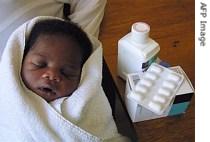2007年VOA标准英语-South Africa Launches New AIDS Drug Initiative
搜索关注在线英语听力室公众号:tingroom,领取免费英语资料大礼包。
(单词翻译)
By Scott BobbSoweto, South Africa
19 April 2007
The government of South Africa recently announced a new plan to combat HIV / AIDS. The plan pledges to provide within five years life-prolonging antiretroviral treatment to 80 percent of the AIDS victims who need it. Currently only 20 percent receive the treatment. But this is not the only challenge facing South Africa's 5 million HIV sufferers, the second highest number in the world. Correspondent Scott Bobb reports on some of these challenges from the ART clinic at the Chris Hani Baragwanath hospital in Soweto.
 |
| A baby sleeps in her mother's arms next to the anti-AIDS drug nevirapine |
Neo has developed diarrhea and a fever, possible reactions to the army of drugs he is receiving to help him fight the AIDS virus that his mother transmitted to him at birth.
Dr. Aneesa Sheik examines Neo as she does every month when he comes in. Neo has been on the drugs for four months, so Dr. Sheik believes his symptoms are not due to a drug reaction, but more likely to an ordinary infection.
The doctor draws blood from Neo to test his immune system, which the AIDS virus is attacking. The drugs help prolong his life.
Neo is lucky. In South Africa only 250,000 AIDS victims have access to Anti-Retroviral Treatment (ART) about one-fifth of those who need it. In South Africa, people with HIV begin ART only when they have or are developing full-blown AIDS. This is partly due to a lack of funds, facilities and care workers.
There are other obstacles.
Dr. Sheik says many people do not reveal that they are sick, because they fear they will be expelled from their families or they fear violence from their partners. And people who do not tell anyone they have AIDS have trouble adhering to the daily regimen.
"There's a lot of stigma1 attached to HIV. Lots of our moms who are not adherent2 to medication with their babies have issues with disclosure," she said.
Neo is doing well, because his mother gives him his medicine regularly. Adherence3 to the treatment is vital to stay healthy and prevent the virus from developing resistance to the drugs.
Dr. Sheik says with the treatment, Neo stands a good chance of living to adulthood4, that is, she says, if he survives his adolescence5.
Smangele, 16, is a girl who is having trouble with adherence. She was raped6 by her brother when she was nine-years-old and has been living with HIV ever since.
Smangele preaches abstinence and safe sex.
"I got this advice," she said. "Stop having sex. If you want to have sex with your boyfriend go to have blood test, because there are many viruses."
But Dr. Sheik says Smangele has been going out with boys. This has angered her family. As a result she has bounced from her mother's house in neighboring Mpumalanga province to an aunt's in Pretoria, to another aunt in Soweto. She has been out of school for a year.
Dr. Sheik asks Smangele why she is not taking her medication. Smangele says as tears roll down her cheeks that her family is always yelling at her.
Dr. Sheik tells her it is vital that she take her medicine regularly.
"If everybody is angry at you, you can't get them back by not taking your medication because you're not hurting them," she added. "You're hurting yourself. You don't take the medication; the virus is going to grow again. The virus grows and it learns how to fight the medication. That medication is not going to work," Smangele said.
Dr. Sheik says treating HIV is different from any other disease.
"HIV is a disease that's very unique. It is not a disease like we've ever treated before, because it's a social disease as well," she explained. "It affects your entire life."
Smangele wants to go back to school. So Dr. Sheik offers her a deal. If she will take her medicine faithfully for two weeks, the doctor will enroll7 her in a school in Soweto. That way she can live with her aunt and also be close to the clinic.
Hopefully, a more stable life will help Smangele take her medicine regularly and live for many more years.
In the meantime, the pharmacy8 has prepared baby Neo's supply of anti-retroviral drugs for the coming month.
Nurse Sibongile Sithene shows Elsie again how to give the medicine to her baby.
But the nurse is concerned that Elsie, who is also HIV positive, has not tested her own immunity9 level to see if she should be on the treatment as well.
Elsie promises to take the test because she is losing weight, but she leaves without saying when. So there is nothing to do but wait until next month when she brings Neo in again.
 收听单词发音
收听单词发音 




